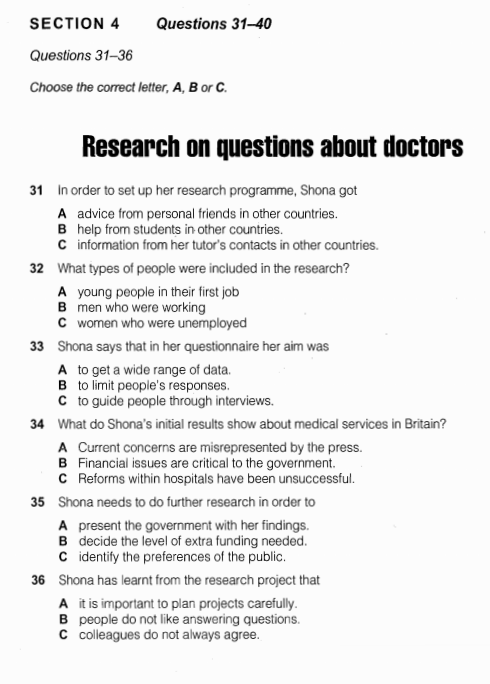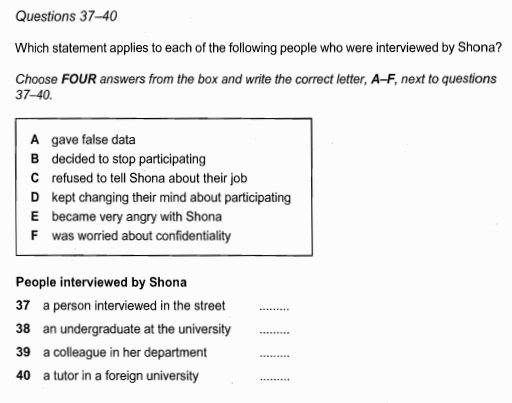剑桥雅思8听力:Test2雅思听力Section3真题及解析
发布时间:2020-12-04 关键词:SECTION 4
I've been doing some research into what people in Britain think of doctors, the ones whowork in general practice - the first call for medical care - and comparing this with thesituation in a couple of other countries. I want to talk about the rationale behind what Idecided to do.
Now Ihad to set up my programme of research in three different countries so I approachedpostgraduates in my field in overseas departments, contacting them by email, to organisethings for me at their end. I thought I would have trouble recruiting help but in fact everyonewas very wiling and sometimes their tutors got involved too.
Ihad to give my helpers clear instructions about what kind of sample population I wantedthem to use. I decided that people under 18 should be excluded because most of them arestudents or loking for their first job, and also I decided at this stage just to focus on menwho were in employment, and set up something for people who didn't have jobs and foremployed women later on as a separate investigation.
I specifically wanted to do a questionnaire, and interviews with a focus group. With thequestionnaire, rather than limiting it to one specific point, 1 wanted to include as muchvariety as possible. I know questionnaires are a very controlled way to do things but 1
thought I could do taped interviews later on to counteract the effects of this. And the focusgroup may also prove useful in future, by targeting subjects I can easily returm to, as theparticipants tend to be more involved,
So l'm just ollating the results now. At the moment it looks as if, in the UK, despite the factthat newspapers continuall report that people are unhappy with medical care. in fact itismainly the third level of care. which takes place in hospitals, that they are worried about.Goverment reforms have been proposed at all levels and ailthough their success is notguaranteed, long-term hospital care is in fact probably less of an issue than the mediawould have us believe. However, l've stil got quite a bit of data to look at.
Certainly Iwill need to do more far-reaching research than I had anticipated in order toestablish if people want extra medical staff invested in the community, or f they want careto revert to fewer, but larger, key medical units. The solution may well be something that can be easily implemented by those responsible in local govemment, with central govermment support of course.
This first stage has proved very valuable though. I was surprised by how illing most of thesubjects were to get involved in the project - I had expected some unwilliness to answerquestions honestly. But I was taken aback and rather concerned that something I thoughtl'd set up very well didn't necessarily seem that way to everyone in my own department.
I thought you might also be interested in some of the probiems I encountered in olletingmy data. There were odd cases that threw me - one of the subjects who I had approachedwhile he was out shopping in town, decided to pull out when it came to the second round. Itwas a shame as it was someone who I would like to have interviewed more closely.
And one of the frst-year students I interviewed wanted reassurance that no names wouldbe traceable from the answers. I was so surprised, because they think nothing of tlling youabout themselves and their opinions in seminar groups!
Then, one of the people that I work with got a bit funny. The questions were quite personaland one minute he said he'd do it, then the next day he wouldn't. and in the end he did doit It's hard not to get angry in that sitution but tried to keep focused on the overall picturein order to stay calm.
The most bizarre case was a telephone interview I did with a teacher at a university inFrance. He answered all my questions in great detail - but then when I asked how muchaccess he had to dangerous substances he wouldn't tell me exacüy what his work involved.It's a real eye-opener ....
第 4 节
我一直在研究英国人民对医生、一般执业医生(次呼吁医疗护理)的人,并将之与几个其他的做法进行比较。我想谈谈我决定做什么背后的理由。
现在,我必须在三个不同的建立我的研究计划,所以我与海外部门的研究生接触,通过电子邮件联系他们,为他们组织一些活动。我以为我在招聘帮助方面有困难, 但事实上每个人都很萎靡不振, 有时他们的导师也参与进来了。
我必须给我的帮助者明确的指示,我想用什么样的样本群体。我决定把18岁以下的人排除在外,因为他们中的大多数是学生或放弃份工作,而且我决定在现阶段只关注就业的男性,并安排一些为没有工作和为以后就业妇女的人做单独调查。
我特别想做一个问卷,并采访一个焦点小组。与问题,而不是限制它到一个特定点,1希望包括尽可能多的变化。我知道问卷是一种可控的做事方式, 但 1
以为我可以在以后做录音采访, 以抵消这种影响。焦点小组将来也可能被证明是有用的,通过定位我可以很容易地重新关注的主题,因为参与者往往地参与,
所以我现在只是对结果进行点对。目前,在英国,尽管报纸不断报道人们对医疗不满意,但看起来似乎。事实上, 它实际上是第三级护理。发生在医院,他们担心。改革已经提出在各级,虽然它们的成功并不保证,但长期的医院护理实际上可能不像媒体认为的问题那么小。然而,我有相当多的数据要看。
当然,如果人们希望向社区投入额外的医务人员,或者如果他们想将护理恢复到更少但更大的关键医疗单位,我还需要做比我预期的更深远的研究,以便建立。解决方案可能是可以很容易地由地方政府的负责人实施,与中央当然是政府支持。
不过,这个阶段被证明是有价值的。我很惊讶的是,大多数的项目都参与到这个项目中去,我本来以为会有一些不恰当的回答。但我很吃惊,担心一些我以为会办得的事情,在我自己部门的每个人看来不是这样的。
我想你可能对我在使用数据时遇到的一些问题感兴趣。有一些奇怪的事情把我吓了一跳——我过去接触过的其中一个对象他去城里买东西,到了第二轮,他决定退出。这是一个遗憾,因为这是谁,我想采访更密切。
我采访的一个大一的学生希望得到保证,从答案中找不到任何名字。我很惊讶,因为他们在研讨会的小组里对你谈论自己和他们的观点一点也不放在心上!
然后和我一起工作的一个人有点搞笑。这些问题都是个人问题,只有一分钟他说他会做,然后第二天就不做了最后,他做到了。在那种情况下,很难不生气,但为了保持冷静,他努力把注意力集中在整体画面上。
最离奇的案例是我和一位大学老师的电话采访。他详细地回答了我所有的问题——但当我问他有多少机会接触到危险的物质时,他没有确切地告诉我他的工作涉及什么。真是大开眼界啊。..


新航道雅思师资点题剑桥雅思8听力:
SECTION 4
谈话场景 :授课 人物关系 :老师 谈话话题 :研究英国人对医生的看法
交际与语言表达
1. 本段文章的主题是研究英国人对医生的看法,并将他们的看法与其他几个的情况进行 比较(comparing this with the situation in a couple of countries)。compare...with... 意为“与...相比”;compare A to B 意为“将 A 比作 B”。
2. I had to set up my programme of research in three countries so I approached postgraduates in my field in overseas departments(我在三个不同的设立了研究项目,同时与海外部 门相关领域的研究生联系)。set up 意为“设立,建立”,单词 establish 也表达类似的意思。approach 既可作动词,也可作名词,此处它是动词,意为“联系”。
3. I though I would have trouble recruiting help but in fact everyone was very willing and sometimes their tutors got involved, too.(我起初还担心很难找到帮手,但是实际上每个研 究生都很积极,有时候他们的导师还参与其中。)have trouble (in) doing sth. 意为“做某事 有麻烦,有困难”。be/get involved in 意为“参与”,表达相似意思的短语还有 take part in/ be participated in。
4. With the questionnaire, rather than limiting it to one specific point, I wanted to include as much variety as possible.(使用调查问卷,而不是仅局限于某个特定的点,如此便可以尽 可能包括不同的类型。)rather than 意为“而非,而不是”。 as ... as possible 意为“尽可能...”, 如 :as soon as possible意为“尽快”,可简写为ASAP;as much/many as possible意为“尽可能的多”。
5. At the moment it looks as if, in the UK, despite the fact the newspapers continually report that people are unhappy with medical care, in fact, it is mainly the third level of care, which takes place in hospitals, that they are worried about.(目前在英国,虽然报纸持续报道人们 不满意医疗服务,实际上只有发生在医院的第三层护理才是人们担心的。)at the moment 意为“现在”,相当于 now。despite 是介词,意为“尽管,虽然”,in spite of 也表示同样 的意思,后面接短语。be unhappy with 意为“对...不高兴 ;对...不满意”,等同于 be un- satisfied with。此处有一个强调句型,it is ... that ...,which 引导非限定性定语从句,修饰 the third level of care。take place 意为“发生”,相当于 happen。
6. Certainly I will need to do more far-reaching research than I had anticipated in order to es- tablish if people want extra medical staff invested in the community, or if they want care to revert to fewer, but larger, key medical units.(当然,我还需要做比预计中要多的意义深远 的研究,以此确认人们到底是想要在社区中投资的医护人员,还是希望到那些比较 少的,但是规模较大、重要的医疗单位就医)。more... than... 是一个明显的比较级 ;in order to 意为“目的是...,旨在,为了”;establish 在此处意为“使确信”,它还有“建立, 确立,制定”的意思。
7. But I was taken aback and rather concerned that something I thought I’d set up very well didn’t necessarily seem that way to everyone in my own department.(但是我很惊讶,也很 担心我之前的美好设计对我们部门的其他人来说未必如此。)take aback 意为“吃惊”, 相当于 very surprised。
师资点题剑桥雅思8听力:
考题解析
Question 31 答案 B
听前预测 :定位词为 set up...research programme,选项关键词分别为 advice...friend、help... students、information...tutor。
题目解析 :本题容易定位,出题句为 ...I approached postgraduates in my field in overseas departments。注意区分选项的关键词,正确答案为 B。
Question 32 答案 B
听前预测 :定位词为 people、include,选项关键词分别为 young people...first job、men... working、women...unemployed。
题目解析 :本题要注意区分干扰信息,如选项 A 通过原文 under 18 should be excluded 可以排 除 ;选项 C 通过原文 for employed women 可以排除。真正的出题句为 I decided at this stage just to focus on men who were in employment,故正确答案为 B。
Question 33 答案 A
听前预测 :定位词为 questionnaire、aim,选项关键词分别为 wide range...data、limit... responses、interviews。
题目解析 :本题容易定位出题句,注意 rather than limiting it to one specific point, I wanted to include as much variety as possible 这句话的重点是在强调 include as much variety as possible, 而 limiting it to one specific point 为干扰信息,故选项 B 为干扰答案。原文中的 as much variety as 对应选项 A 中的 a wide range of,所以 A 为正确答案。
Question 34 答案 A
听前预测 :定位词为 initial results、medical services、Britain,选项关键词分别为 misrepresented...press、financial issues...government、reforms...hospitals...unsuccessful。
题目解析 :本题定位不难,但出题句较长并结构复杂。原文说 despite the fact that newspapers continually report that people are unhappy with medical care, in fact it is mainly the third level of care, which takes place in hospitals, that they are worried about(虽然报纸持续报道人们不满意 医疗服务,实际上只有发生在医院的第三层护理才是人们担心的),言外之意是媒体误传了信 息,故正确答案为 A。
Question 35 答案 C
听前预测 :定位词为 further research,选项关键词分别为 government...findings、extra funding、 preferences of the public。
题目解析 :原文中 far-reaching research 对应题干的 further research,出题句为 in order to establish if people want extra medical staff invested in the community, or if they want care to revert to fewer, but larger, key medical units(为了确认人们到底是想要在社区中投资的 医护人员,还是希望到那些比较少的,但是规模较大、重要的医疗单位就医)。其中 establish 意为“确认”,revert to 意为“恢复(状态)”,medical unit 意为“医疗单位”,故正确答案为 C“确认大众的需求”。
Question 36 答案 C
听前预测 :定位词为 research project,选项关键词分别为 plan projects carefully、people...not like answering、colleagues...not always agree。
题目解析 :本题难度较大,注意 but 之后为出题句 something didn’t necessarily seem that way to everyone in my own department(对于有些事情,并非我们部门的每个人想法都一样),故 选项 C 为正确答案。
Questions 37-40
听前预测:配对题的做题步骤和方法为:
(1)确定主题为“评论”配“人物”;
(2)分别找出选项和题目的关键词,选项关键词分别为false data、stop participating、refused...tell... job、change minds、angry、worried...confidentiality ;题 目关键词分别为person...street, undergraduate, colleague, tutor ;
(3)文章按照题号顺序读题,重点关注选项的同义替换。
Question 37 答案 B
题目解析 :本题题干的同义替换为 one of the subjects who I had approached while he was out shopping in town。听到这句话后,要重点关注后面信息 decided to pull out when it came to the second round(第二轮时决定退出),其中 pull out 意为“退出”,the second round 意为
“第二轮”,对应选项 B“决定停止参与”。
Question 38 答案 F
题目解析 :本题题干同义替换为 one of the fist-year students,出题句为 wanted reassurance that no names would be traceable from the answers,其中 no name、traceable 对应选项 F was worried about confidentiality“担忧保密性”。
Question 39 答案 D
题目解析 :本题题干同义替换为 one of the people that I work with, 出题句为 ...one minute he said he’d do it, then the next day he wouldn’t, and in the end he did do it...。本题难度不大,很 容易判定出题句对应选项 D“对是否参与一直在变换主意”。
Question 40 答案 C
题目解析 :本题题干同义替换为 a teacher,出题句为 he wouldn’t tell me exactly what his work involved(他没有明确地告诉我他的工作),从而可以判定出题句对应选项 C refused to tell Shona about their job。




